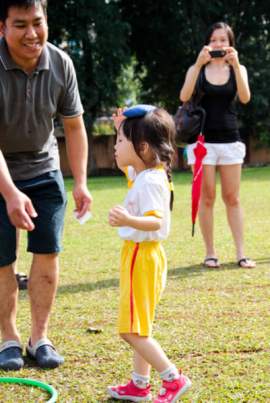
All You Need to Know About Reactive Attachment Disorder

Reactive attachment disorder is an extreme mental and emotional disorder, which inhibits a child's ability to form meaningful relationships and emotional bonds with their parents or guardians. In most cases, a child will develop reactive attachment disorder as a result of abuse or neglect.
Definition
Reactive attachment disorder is a severe psychological disorder in which an infant or a child is unable to form an emotional connection to one or both of their parents or guardians. Reactive attachment disorder is extremely common is cases in which an infant has been abused or neglected. It will often be seen when a child is adopted.
Treatment
There is no set course of treatment for reactive attachment disorder. The treatment will vary and it will depend on the specific circumstances surrounding each case of reactive attachment disorder. Often, treatment will involve educating the parents or guardians of a child how to change their behavior in order to react to their child more sensitively.
Many times, reactive attachment disorder has developed because of a parent's or guardian's actions and behavior. Therefore, treatment may be aimed at altering this behavior. Treatment for reactive attachment disorder may also include therapy in order to help teach the child how to form meaningful relationships and emotional bonds with their parents or guardians. In some cases, medication will be administered to a child who is suffering from reactive attachment disorder in order to help them cope with the anxiety and the depression that often accompanies the disorder.
Many extreme forms of treatment have been developed and implemented in order to cure reactive attachment disorder. It is not recommended that these methods be used on a child, as they may cause extensive physical and emotional damage. Instead, it is suggested that if a parent or guardian suspects that a child is suffering from reactive attachment disorder, that they consult with their doctor in order to find out which method of treatment would be best for their child.
Support Groups
Reactive attachment disorder is a very serious psychological complication. Many support groups have been developed in order to provide children, parents and guardians who are suffering from reactive attachment disorder with assistance. There are many online support groups that are dedicated to the treatment of reactive attachment disorder. They will provide the parents of children who are suffering from the disorder with information about the disorder, as well as access to articles written about topics related to the disorder.
These support groups will provide chat rooms and forums that will allow individuals who are suffering from the disorder, or who have children who are suffering from the disorder, to have contact with individuals who are currently in or who have been in similar situations. They will be able to provide children who are suffering from the disorder, and parents who are trying to cope with the disorder, with advice.
It will help individuals who are dealing with reactive attachment disorder to realize that they are not alone and that there is help available to them. Joining a support group may be very beneficial to both the child and to the parents.
In School
When a child who is suffering from reactive attachment disorder begins to attend school, the disorder may present a variety of problems and complications. A child who is suffering from this disorder may appear to be friendly and outgoing when school begins. However, after a few weeks the child will begin to partake in negative behavior and unacceptable actions. They may not complete assignments in order to assert their control over their environment. They may also become extremely loud and disruptive, attempt to speak over the teacher, and distract the class.
It is essential for a child who is suffering from reactive attachment disorder to be in control of their environment at all times. This is the only way that a child with this disorder will feel safe and secure. A child who is suffering from reactive attachment disorder may also take part in extremely destructive behavior and steal or destroy other people's personal belongings.
A child with this disorder may be labeled as a "problem child." It is important to keep in mind that the child has developed these behaviors as a result of abuse. If a teacher suspects that a child is suffering from abuse at home, then it is extremely important that the teacher report it to the local law enforcement agency.



















